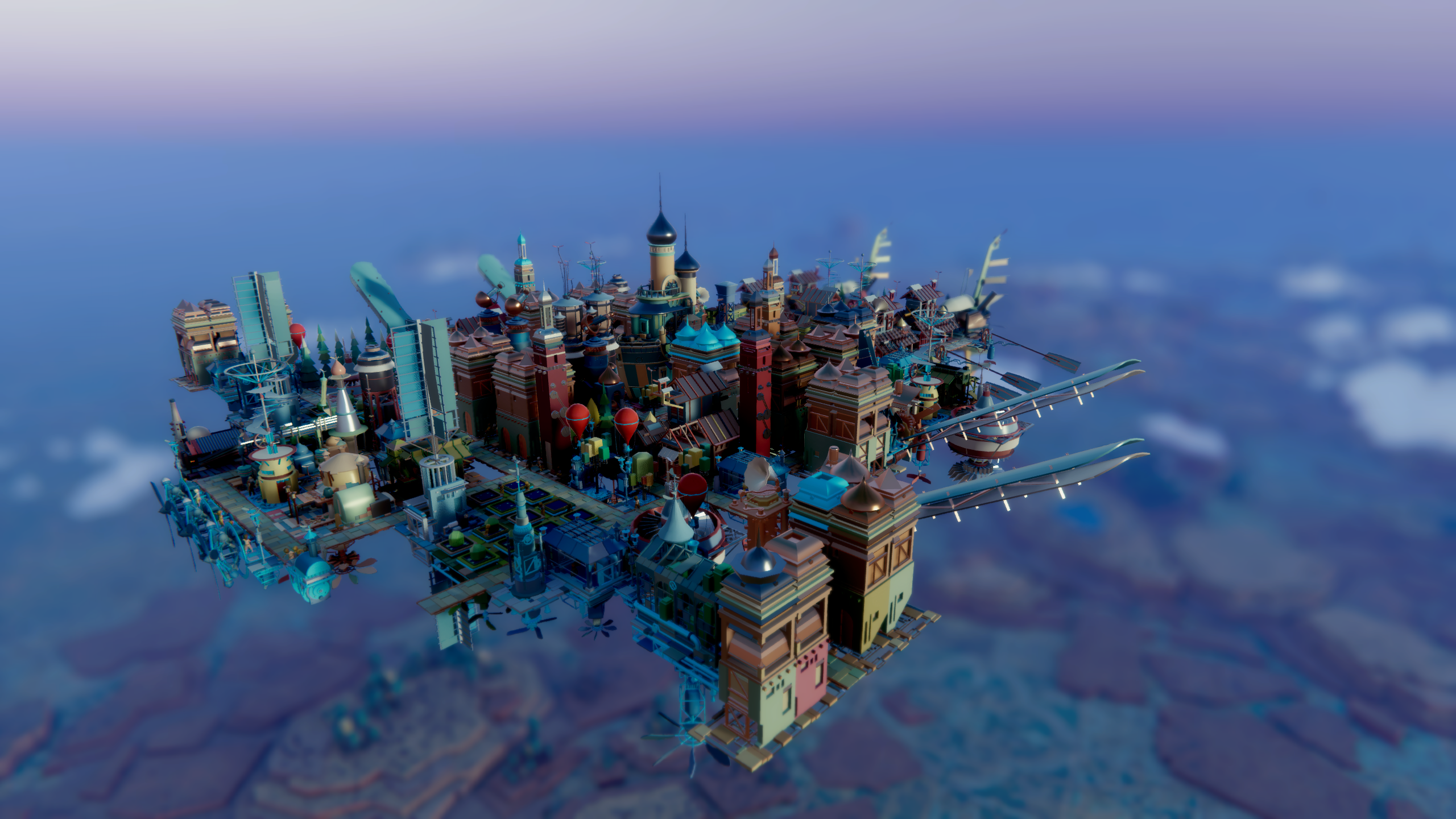Our Verdict
A smart, hypnotic city builder that won't leave you tearing out your hair.
PC Gamer's got your back
What is it? A city builder in the clouds.
Expect to pay: £20
Developer: The Wandering Band
Publisher: The Wandering Band
Reviewed on: GTX 1080 Ti, Intel i7-8086K, 16GB RAM
Multiplayer? No
Link: Official site
I have built a lot of cities over the years, and I've given my citizens plenty of reasons to flee them. In Cities: Skylines, I flooded their homes in liquid poo; In Surviving Mars, I left them to suffocate; In Anno 1800—and this is the one that's left me most ashamed—I failed to provide them with enough sausages. Airborne Kingdom, however, is the first city builder where I've lost people because the city was leaning too much.
Before this became a review, my plan was to play an hour of Airborne Kingdom to get some gifs, but instead it ended up stealing most of a day, with me finally leaving my floating metropolis at midnight. And then I kept coming back. I'm an easy mark for a city builder and rarely manage to escape their grasp quickly, but Airborne Kingdom lodges itself in its own niche thanks to some unusual experiments and its spectacular style.
The basics are familiar and conventional: you build simple production chains and infrastructure to fulfil the needs of the city and its denizens, with the demands of both getting more complicated as you expand. Power, food, factories, morale-boosting diversions—there's loads to build, but you'll recognise all the categories. All this is happening in the sky, though, and that's a pretty substantial wrinkle.
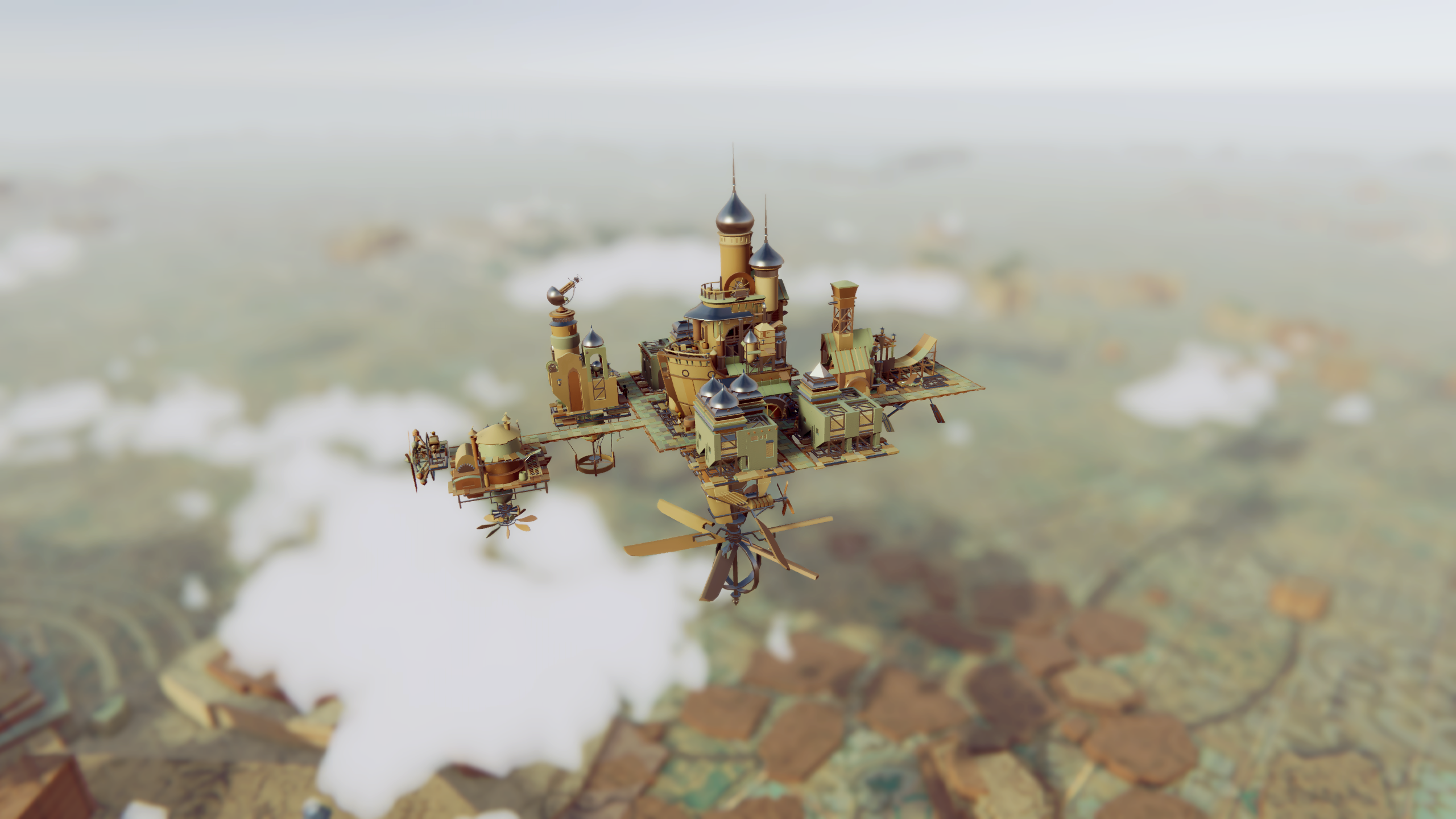
Airborne Kingdom doesn't feature any combat or even a whiff of conflict, at least not with other people. The war against gravity, though, never ends. Physics is a constant obstacle, and more than anything else it's that force of nature that determines your city's layout. You start out with just a little town centre, gently bobbing away in the sky, perfectly balanced. But once you start placing houses, hangars for your planes and towering minarets, it's going to start sinking, so you'll need to generate more lift. And you're going to need to make sure it's all even.
Too much tilt and your citizens will peace out. And who can blame them? Nobody wants to live in a place where they have to nail down their furniture, or where they're greeted by a view of the ground, miles below them, every time they look out the window. They can stomach a little bit of tilt, but I can't. It just looks like a disaster waiting to happen. And it only takes one little building to push it over the edge.
Since you have to find and directly recruit your citizens, their loss can sting, and you might end up left with too few people to work or explore, necessitating some unwelcome downsizing as you destroy buildings and try to plan your comeback. They're a precious resource, but it's coal that keeps your city aloft. All your most important components burn through the stuff, and unlike other resources it can only be stored in one location, limiting how much you can stockpile. Without that resource, the city's done for—sadly it's a bit too heavy to gently float to the ground.
Physics ends up being an excellent replacement for terrain. Geography is a defining feature of a city, and thus city builders, but it loses its impact when you can soar above it all. You've got infinite space, but thanks to physics you can just keep expanding in whatever direction you want. You have to build methodically, and then make lots of little adjustments. If the city is lying a bit low, maybe chuck in a new fan or some wings. If all the new buildings are creating too much drag, some more propellers could give you a bit more propulsion. All of these things require resources, workers and space, of course, which might inspire yet more adjustments.
These limitations have forced me to spend a lot more time considering how my city should grow, and it means no section is ever really complete—I'm always redesigning them. The result is something dynamic and organic, constantly shifting to meet new needs. I had a plan for how I wanted my city to look, and it now looks nothing like my vision. Instead it's something built out of my reactions to imminent disasters, my experiments, my experiments to fix the problems created by my previous experiments, and a few cosmetic flourishes. It's a bit of a mess, but I love it.
The world below still plays an important role. It's where all your resources are found. Absolutely everything you need to build with, continue flying and keep your people alive is found on the ground, and you can explore the entirety of the map at your leisure. To keep your city fuelled and fed, you'll have to constantly stay on the move, sending down workers in planes to gather up what you need. While Airborne Kingdom doesn't lean into its survival elements as much as, say, Surviving Mars, the relationship between the world and the survival mechanics is as strong as it is with a pure survival game.
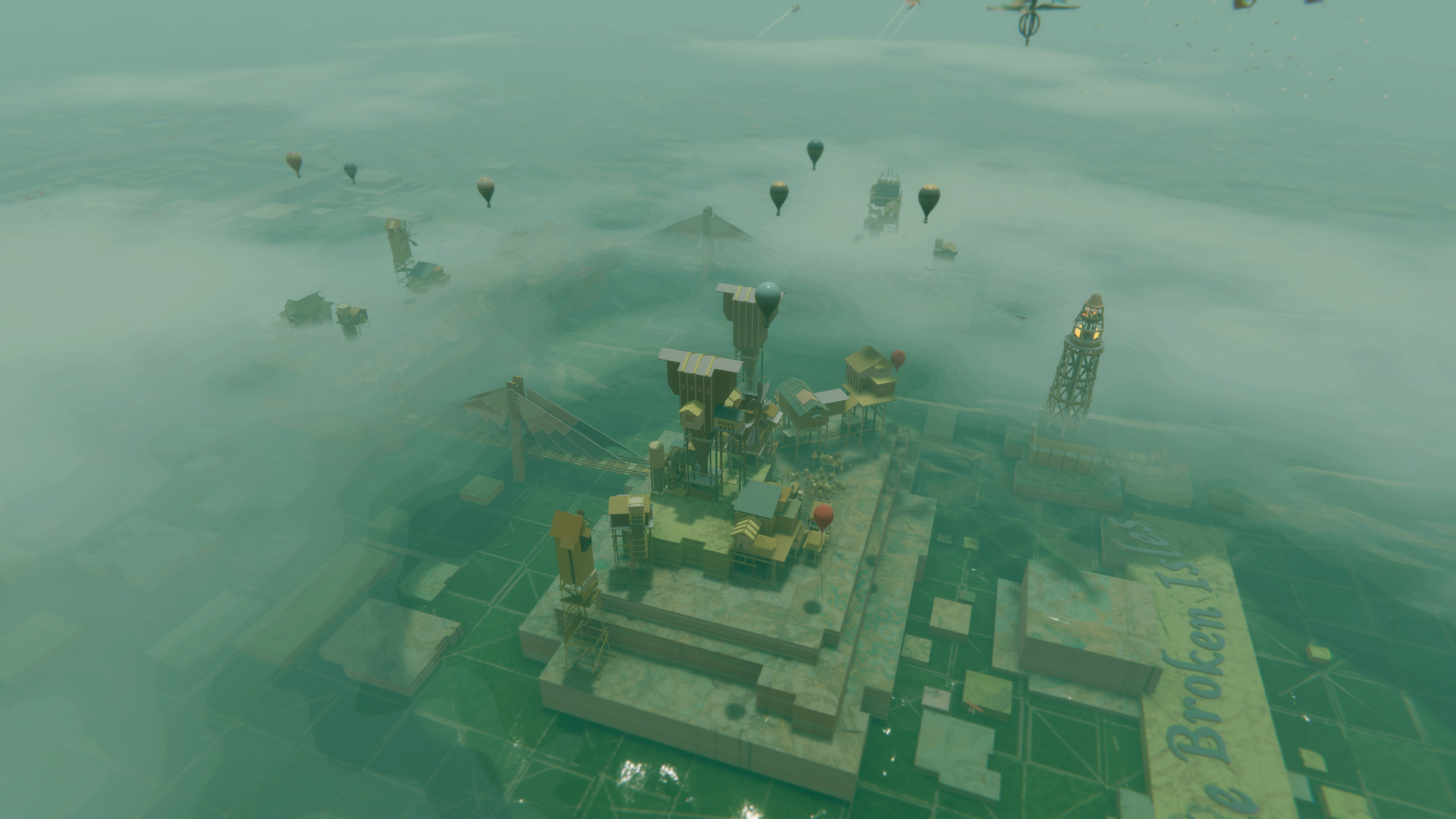
Instead of giving you more places to build, the world exists to be explored. There are small settlements and cities waiting to be discovered and traded with, plenty of hidden bounties, and a few secrets that can be used to unlock wonders that will make your already very impressive city even more enviable. The map is presented as a literal map, with little embellishments like curling, torn edges, and provides just as much eye candy as the city.
Despite dabbling in survival management, Airborne Kingdom maintains a relaxing pace. There are complications, crises and plenty of ways to cock everything up, but the first biome has all the resources you need in abundance, letting you build up a nice stockpile, and while scarcity can become an issue, you can return to a less challenging area pretty quickly and recuperate. For the most part, it's light and breezy. Those aren't typically adjectives I seek out in management games, but it's really kept me too focused on scouring the map and working on my own projects to notice that the challenges are infrequent and tension rare.
Importantly, this pleasant pace gives you plenty of room to flex your creative muscles. You're not just building a city—you're creating a weird architectural marvel. While there are plenty of concerns that will shape your city, you're also free to follow your aesthetic tastes. This goes beyond building placement, too, since you'll uncover lots of paint schemes that you can apply to buildings individually, by type, or all at once. Much like Oskar Stålberg's enchanting Townscaper, you can approach city design as an artist as well as a planner.
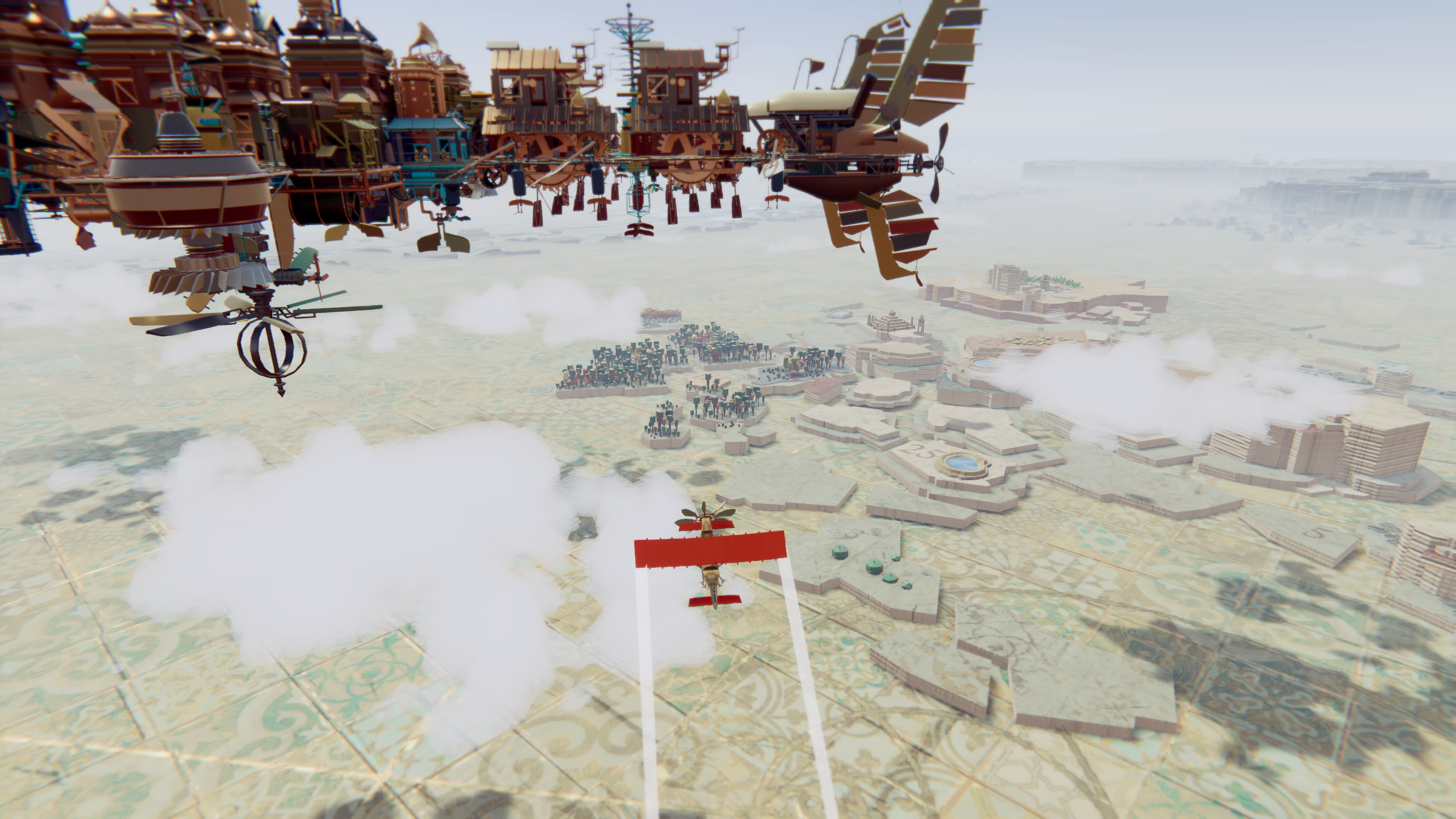
Sometimes I like to just slow things down to a crawl and stare at my magnificent creation. It's constantly buzzing with life, from the narrow streets, to the skies around the city. Even the buildings can't sit still, and they have a tendency to flap and spin and generally make the city look like a madcap contraption built by an out of control toymaker. It's hypnotic, though I suspect actually living there would be a lot like living in a carnival that never ends, perpetually surrounded by weird noises and arcane machines, which sounds quite stressful.
The only place the breeziness becomes a problem is when you're dealing with other cities. See, your ultimate goal is to create your airborne kingdom by forging alliances with all the cities on the ground, unifying the world. It seems ambitious, when in fact it's a doddle. You fly up to a city, find out what it needs, get directed to the exact spot you'll find that thing, and then—after depositing some resources—you're best buds. The process never changes or spurts out any surprises. Every quest feels like an afterthought.
Nobody seems to have any concerns about this flying city appearing out of nowhere and making everyone join its empire, either. Once you've added a city to your list of allies, you never really need to think about it again. Your allies are always content. Airborne Kingdom never really explores its premise or lets you question your objectives. You don't need to make hard calls or worry about becoming a tyrant, because you're always presented as a benevolent force that everyone wants to be mates with.
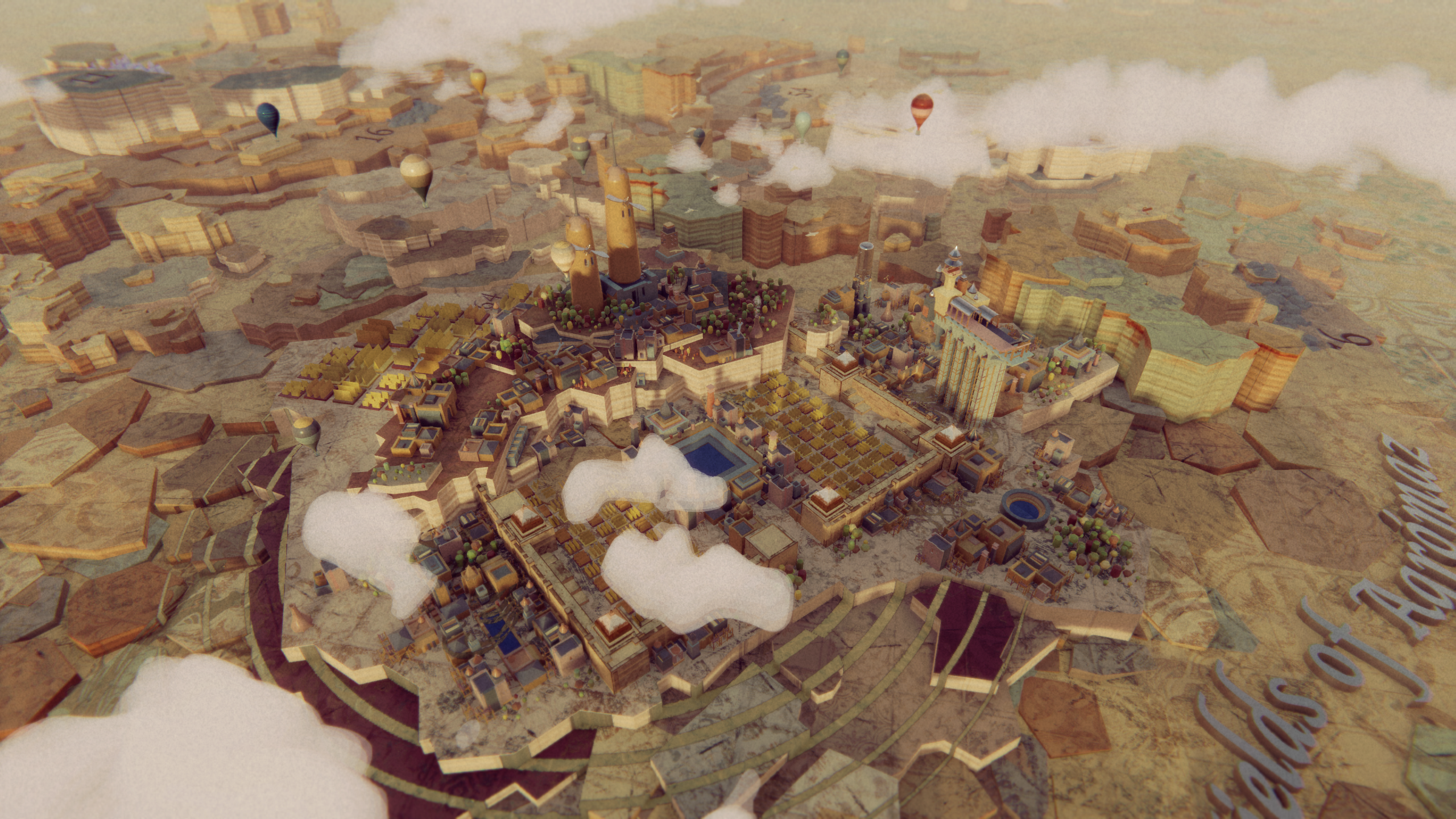
The ground-based cities also serve as trade hubs, offering up a long list of resources you can barter for. It's handy in a pinch, but I never found myself needing to go on spending sprees and only went shopping once or twice. The whole system really just seems to exist for emergencies, and there's no economy to interact with. You won't be creating trading routes or trying to turn a profit. The cities value different things, so you do need to think about where you're shopping, but it doesn't get much more involved than that.
I can understand, however, why The Wandering Band might have been hesitant to bog the game down with more complications. It's already got countless buildings, resources, an elaborate tech tree and plenty of novelties demanding your attention, and all of that has impressively been squeezed inside a game that you can wrap up in ten hours. Surprisingly little has been sacrificed to make it something you can devour over a weekend. And you can spend a lot longer with it if you fancy.
Before I made my final ally, I spent ages just repainting my city. I kept changing my mind. Sometimes I wanted uniformity, but then I'd get the notion to just throw random colours out there to see how it looked. There was a lot of clashing. A pink roof, red walls and green floors? Fine by me. I guess I'm a bad king, but in very mundane ways that don't lead to an execution—especially since nobody has invented a guillotine yet. I made every building bright blue once, but I've never let my people starve. Well, not for long.
A smart, hypnotic city builder that won't leave you tearing out your hair.

Fraser is the UK online editor and has actually met The Internet in person. With over a decade of experience, he's been around the block a few times, serving as a freelancer, news editor and prolific reviewer. Strategy games have been a 30-year-long obsession, from tiny RTSs to sprawling political sims, and he never turns down the chance to rave about Total War or Crusader Kings. He's also been known to set up shop in the latest MMO and likes to wind down with an endlessly deep, systemic RPG. These days, when he's not editing, he can usually be found writing features that are 1,000 words too long or talking about his dog.
